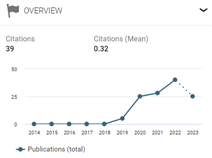Analisis ketahanan pangan keluarga dan pendapatan sebagai determinan status gizi balita di Kabupaten Ende
DOI: 10.30867/gikes.v6i2.2491Abstract
Background: Nutritional problems in children under five, especially malnutrition, are still a challenge in Indonesia, including in East Nusa Tenggara Province. Based on the latest data, the prevalence of underweight toddlers reaches 22%, obesity 2%, and stunting 15,5%. Family food security and income levels are important factors that affect the fulfillment of children's nutritional intake, which ultimately impacts nutritional status.
Objectives: This study aims to analyze the relationship between family food security and income level to the nutritional status of toddlers aged 24–59 months in Ende Regency.
Methods: This study used an analytical observational design with a cross-sectional approach. The sample consisted of 194 mothers and toddlers aged 24–59 months who were selected in Ende District and Central Ende District, which was carried out from December 2024 to February 2025. Independent variables include family food security and income level, while dependent variables are the nutritional status of toddlers. Data analysis was carried out using the Chi-Square test.
Results: The study showed that there was a significant relationship between family food security and the nutritional status of toddlers (p = 0,000), as well as is not between income level and nutritional status of toddlers (p = 0,646) in Ende and Central Ende Districts.
Conclusion: Family food security and income level were significantly related to the nutritional status of toddlers aged 24–59 months in Ende Regency.
Keywords
Full Text:
PDFReferences
Besora-Moreno, M., Llauradó, E., Tarro, L., & Solà, R. (2020). Social and economic factors and malnutrition or the risk of malnutrition in the elderly: A systematic review and meta-analysis of observational studies. Nutrients, 12(3), 1–16. https://doi.org/10.3390/nu12030737
Hidayati, N. I. D. (2023). Hubungan pendapatan keluarga dan ketahanan pangan dengan status gizi balita pada era pandemi covid-19 di Kabupaten Pasuruan. Media Gizi Kesmas, 12(1), 359–366. https://doi.org/10.20473/mgk.v12i1.2023.359-366
Jeong, S., & Choi, Y. J. (2023). Association between household income levels and nutritional intake of allergic children under 6 years of age in Korea: 2019 Korea National Health and Nutrition Examination Survey and application of machine learning. Frontiers in Public Health, 11, 1–14. https://doi.org/10.3389/fpubh.2023.1287085
Kementerian kesehatan RI, badan kebijakan pembagunan kesehatan. (2023). Dalam Angka. Kota Bukitinggi Dalam Angka, 01, 1–68.
Masnah, C., & Saputri, I. M. (2020). Faktor risiko gizi kurang pada balita di Puskesmas Paal V Kota Jambi. Riset Informasi Kesehatan, 9(2), 107. https://doi.org/10.30644/rik.v9i2.451
Masthalina, H., Santosa, H., Sudaryati, E., & Zuska, F. (2021). Household food insecurity, level of nutritional adequacy, and nutritional status of toddlers in the coastal area of central tapanuli regency. Open Access Macedonian Journal of Medical Sciences, 9, 1371–1375. https://doi.org/10.3889/oamjms.2021.7571
Mei, C. F., Faller, E. M., Chuan, L. X., & Gabriel, J. S. (2020). Household income, food insecurity and nutritional status of migrant workers in Klang valley, Malaysia. Annals of Global Health, 86(1), 1–10. https://doi.org/10.5334/aogh.2859
Mustajab, A. azam, & Indrawati Aristiyani. (2023). Dampak status ekonomi pada status gizi balita. Jurnal Keperawatan Widya Gantari Indonesia, 7(2), 138–146. https://doi.org/10.52020/jkwgi.v7i2.5607
Oktaviasih, A. A., Sartono, A., Susantini, P., & Ayuningtyas, R. A. (2022). Hubungan pengetahuan gizi ibu, pendapatan, ketahanan pangan keluarga dengan status gizi siswa MTs Muhammadiyah Pemalang. Jurnal Gizi, 12(2), 107. https://doi.org/10.26714/jg.12.2.2023.107-117
Pangaribuan, I. K., Simanullang, E., & Poddar, S. (2020). The analyze toddler growth and development according to family’s economic status in Village Limau Manis, Districts Tanjung Morawa. Enfermeria Clinica, 30, 92–95. https://doi.org/10.1016/j.enfcli.2019.11.029
Putri, D. K., & Puspikawati, S. I. (2024). Hubungan ketahanan pangan rumah tangga dengan status gizi pada anak. 5, 2358–2365.
Rambadeta, A. D., Sir, A. B., & Hinga, I. A. T. (2024). Hubungan karakteristik ketahanan pangan rumah tangga dengan kejadian stunting pada balita di Wilayah Kerja Kelurahan Naioni Kota Kupang. SEHATMAS: Jurnal Ilmiah Kesehatan Masyarakat, 3(4), 692-700.
Ria, F. (2020). Hubungan pendapatan keluarga dengan status gizi balita usia 1-5 tahun di Puskesmas Kisaran Kota Tahun 2019. Jurnal Maternitas Kebidanan, 5(2), 55–63. https://doi.org/10.34012/jumkep.v5i2.1151
Sahdhina, R. S., Ana Dina, R., Fajriah, E., & Zahra, A. (2024). Hubungan Pendapatan keluarga dan pengetahuan gizi ibu dengan dampaknya terhadap status gizi anak usia sekolah di Desa Babakan. Jurnal Sains Dan Teknologi Kesehatan, 4(2), 44–51. https://doi.org/10.52234/jstk.v4i2.296
Tono, Andayani, W. D., Hidayat, A., Maheswari, D. L., & Ulfa, A. N. (2022). Indeks Ketahanan Pangan 2022. Antimicrobial Agents and Chemotherapy, 58(12), 7250–7257.
Refbacks
- There are currently no refbacks.














